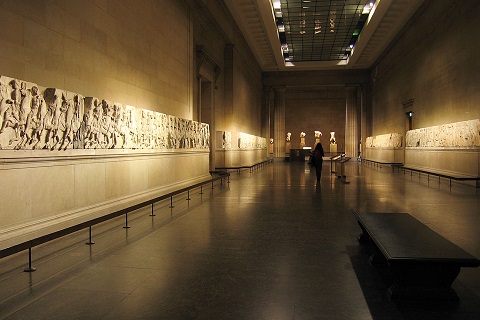Greece should take the UK to an international court to win back the so-called Elgin Marbles, according to legal advice prepared by senior human rights lawyers including Amal Clooney and Geoffrey Robertson.
By Ian Johnston, Independent
Athens has the best chance of securing control of the sculptures if it takes action through the International Court of Justice or the European Court of Human Rights, according to a 150-page report prepared by its team of eminent global lawyers.
Such a step would represent a marked escalation in the Greek government’s campaign to retrieve the marbles. Greece has long sought their return but has never previously taken legal action.
About half of the sculptures on the Ancient Greek Parthenon temple were taken by Lord Elgin in the early 1800s and he later sold them to the British Government after getting into financial trouble. They have been kept in the British Museum ever since.
Last year the Greek government commissioned a team of international lawyers, including Amal Clooney – the Lebanese-British wife of actor George – to advise on securing their return. Reports in the Greek press suggest that legal action is now likely.
“The British adhere to international law… The Greek government has never taken advantage of this Achilles’ heel,” the Kathimerini newspaper quoted the lawyers’ advice as saying. “You must take legal action now or you may lose the opportunity to do so due to future legal obstacles.”
The lawyers reportedly suggest that Greece should first make a formal request for the marbles’ return, then lodge a claim at the International Court of Justice. If that court refused to take the case, then Athens should approach the European Court of Human Rights in Strasbourg. A source said the legal team believe that if an international court accepted jurisdiction, then there would be a “75-80 per cent chance” that it would rule in Greece’s favour. The legal advice cites a precedent in which Thailand was forced to return sculptures removed from a Hindu temple, Preah Vihear, to Cambodia by an International Court of Justice ruling in 1962.
It also suggests the Strasbourg court would look favourably on the case under the European Convention on Human Rights. One possible obstacle is the Conservatives have pledged to change the law so that Strasbourg’s rulings are “no longer binding” on the British Supreme Court. And the new Culture Secretary, John Whittingdale, has made clear that he supports the British Museum.
The Greek government has said only that its current stance was unchanged.
A spokesman for the Department for Culture, Media & Sport said: “The Parthenon sculptures were acquired legally in accordance with the law of the time and the British Museum is the rightful owner.”
Andrew George, chairman of UK-based campaign group Marbles Reunited, said the prospect of a court case was “very regrettable”.
“It’s just such an enormous pity it’s got to this. The ignominy this will bring on Britain … this is going to make Britain look very small, as if we are purely self-interested and not considerate of the sensitivities of other countries,” he said.



















